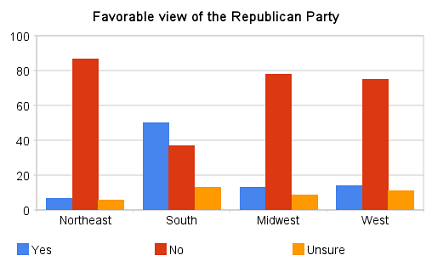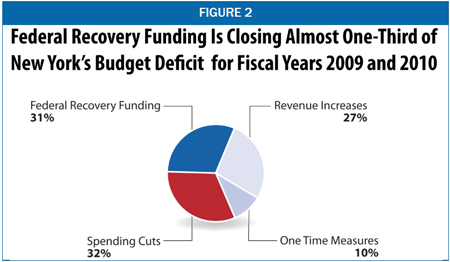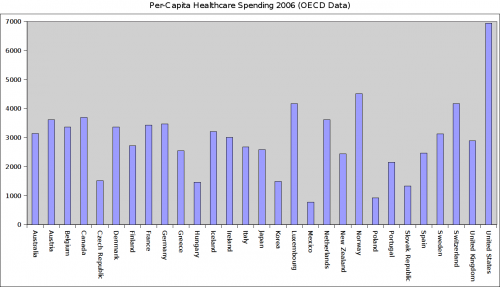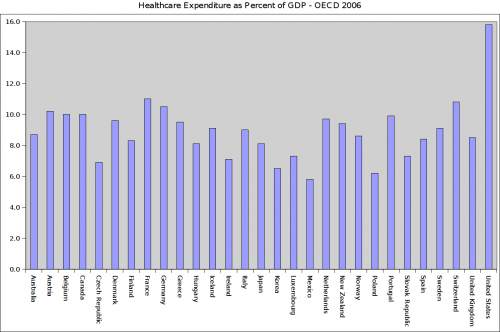Analysis
It's Hard Out There for a Republican
Mon, 09/21/2009 - 15:10 — RottenchesterSteve Benen at Washington Monthly created this graph from Research 2000 polling:

Even though the 29th is more Republican than the Northeast in general, I think this is a pretty powerful display of what I was trying to say in this post. The boilerplate rhetoric from the current Republican party only appeals to Southerners. Reed can't have a cut-and-paste campaign -- he needs to distinguish himself from the rest of the party.
Indicators of Failure
Sun, 09/20/2009 - 21:20 — RottenchesterJoe Dunning's column in the Leader was appropriately tough on Tom Reed's campaign, which has made a number of tactical errors in the past months. But, to his credit, Reed made one strategic decision that trumps most of those errors: he started early. A majority of voters won't be paying close attention to this race until well over a year from now, and by then many of Reed's missteps will be ancient history.
A few dumb comments, or even taking government money as part of his business, won't sink Reed's ship by itself. Far more dangerous is the perception that Reed is taking orders from the DC Republican party. Ultimately, if I had to pick the most important factor in Kuhl's 2008 loss, it was the perception that he was paying more attention to his party bosses than the residents of the 29th district.
It's hard to imagine two individuals more different than Eric Massa and Amo Houghton, but neither of those men took orders from their party bosses. Amo had, and Massa has, a set of votes that differentiate each of the men from the average order-taking backbench party loyalist. Their war votes -- Amo's against the Iraq War, and Massa's against the Afghanistan War -- are just two examples.
Of course, in Amo's case, he was part of a strong tradition of moderate Republicanism that originated in New York and is now gone from the political scene. Unfortunately, Reed can't rely on that tradition to inform his rhetoric. Instead, he, like Randy Kuhl, sounds very like a right-wing radio host.
Perhaps the best example of this kind of rhetoric is the comments that Reed made about the stimulus bill. Here's a mayor -- whose small town is getting millions of dollars in stimulus funding -- calling the stimulus a "slush fund". Here's a resident of a state facing a huge budget shortfall -- one that would have decimated residents of his district -- claiming that the only proper use of stimulus funds is infrastructure projects. And here's a candidate who enlists the loser of the last election to fundraise by dismissing the stimulus as nothing more than "liberal pet projects".
This, not a badly schedule press conference or some intemperate remarks about reading legislation, is what will sink the Reed campaign if it continues.
Stimulus Reality
Fri, 09/18/2009 - 06:55 — RottenchesterOne of the key points of dispute between Tom Reed and Eric Massa is whether the grant Reed received is "stimulus money". The answer to that question is complicated.
The Center on Budget and Policy Priorities, a Washington think tank, did some analysis of the impact of the stimulus bill on New York State's budget. This graph shows how the Center believes the stimulus helped cover the shortfall in the 2009/2010 budgets:

Here's the Center's analysis:
New York predicted that without changes to its revenue structure or spending programs, available funds in fiscal year 2010 (the 12-month period beginning April 1, 2009) would fall about $17.9 billion or 26 percent short of what was needed to balance the budget. In addition, New York’s FY2009 budget was projected to be short $2.2 billion due to declining revenues and rising costs.
The federal recovery law is providing New York $6.2 billion in federal funding that it is using to help close its budget gap. This includes $5 billion in additional federal Medicaid funding, $876 million in education-related State Fiscal Stabilization Fund money, and $274 million from the “government services” component of the State Fiscal Stabilization Fund.
It's clear that the stimulus had a direct impact on the New York State budget. The question is whether the $150 million grant program that funded Reed's grant would have survived if New York hadn't gotten a massive stimulus payment.
Reed Begins Digging Hole
Tue, 09/15/2009 - 16:28 — RottenchesterTom Reed's campaign has issued a press release (reprinted in full after the break) where he accuses Eric Massa of "mudslinging".
Here's a choice quote:
“Anyone who has actually taken the risks to begin and operate businesses in New York knows how difficult it is to create jobs in our state,” Reed continued. “Job creators find some of the highest taxes and most severe regulatory burdens."
“When Massa criticizes folks for taking advantage of public incentives, it clearly demonstrates that he doesn’t understand these challenges.”
I don't know what Massa said at his press conference today, but the notion that someone getting a $1.18 million grant from New York State is a victim of high taxes and regulatory burdens is a laugh-out-loud statement.
A person getting those grants is a perpetrator. Small businessmen like me, who aren't looking for a state handout to make a profit, are the victims, since we're paying higher taxes to support recipients of this kind of crony welfare.
It's not too tough to put together a group of investors to "risk" $820K to get $1.18 million in free money. Those investors know full well that there's an excellent chance that they'll make a profit when the newly renovated Bath Masonic Temple is sold, since your money and mine is serving as a $1.18 million cushion to protect their investment.
Here's the press release:
Reed Gets $1.18 Million Grant
Tue, 09/15/2009 - 13:05 — RottenchesterThe Steuben Courier reports that Tom Reed was the recent recipient of a "Restore New York" grant facilitated by State Senator George Winner. Reed, who owns the Masonic Temple in Bath, will match that grant with $820,000 of private funding.
I won't be able to attend Reed's press conference tomorrow, but t The obvious question is how long Reed has owned the building, and how much he paid for it. If the answers are "not long" and "not much", then he has a huge problem. As it stands, unless there's some innocent explanation (e.g., Reed chairs a non-profit development group and isn't really the "owner"), this looks like a case of Southern Tier crony "capitalism".
Also, I would imagine that Reed's previous statements about fiscal responsibility and the need to limit stimulus funding will get closer scrutiny in light of this grant.
What a Speech
Wed, 09/09/2009 - 21:21 — RottenchesterPresident Obama delivered big tonight, and his speech will have a big effect on the 29th district race.
In Massa's corner, the effect of the speech depends on the details of the public option that ultimately comes from the bill. While Obama clearly stated that a public option is a necessary part of any bill, he hedged a bit by naming co-ops as one possible implementation. Since the details of the public option was the main reason Massa opposed the current House bill, we'll see if the changes (if any) to that legislation that come from Obama's speech will be enough to push Massa into the supporter category.
Even more interesting is the effect of the speech on Republicans like Tom Reed. Obama endorsed tort reform, raised the possibility of co-ops, came out strongly for laws against the barring of pre-existing conditions, and pledged that he will only sign a bill that will be deficit neutral. This addresses all but one of Reed's laundry list. The remaining issue is Reed's support for small business tax incentives finance employee insurance. Obama says that 95% of small businesses will be exempt from the requirement that they provide insurance. There's not a lot of difference between those two stands.
Obama has put a great deal of pressure on members of his party, and members of the opposition, to be reasonable. It's going to be a fascinating few weeks, hopefully far different from the last month of sideshows and shouting.
Waiting for the Speech
Wed, 09/09/2009 - 19:57 — RottenchesterThe big event of the week is tonight's address by President Obama. Eric Massa has postponed his press conference until tomorrow, and he'll also be appearing on Fox and Friends at 6:45 AM.
Tom Reed did not postpone his press conference, and the Star-Gazette reports that he's hoping for tort reform. Hope is all that he can do, because his party's reluctance to engage on healthcare reform has cost them a seat at the table where they could push their agenda.
Morning News: The Last Big Meeting
Tue, 09/01/2009 - 07:03 — RottenchesterThe Corning Leader and the Star-Gazette attended last night's meeting in Horseheads. About 800 people showed up. The S-G's coverage includes a photo of a pair of senior citizens with the sign "Govt Health is Dead on Arrival". They must have run out of room for the rest of the slogan: "for others, not us".
WETM also has a short story about the meeting.
Today's Democrat and Chronicle carries an op-ed from a local physician who describes the atmosphere at the Victor town hall meeting:
I arrived at the town-hall meeting for Rep. Eric Massa, D-Corning, with an eagerness for respectful debate. I left with a sense of disgust and disappointment. The atmosphere was so vicious that any attempt at meaningful dialogue was met with perverse heckling including screams that our nation should have "dropped a nuke" on Iraq instead of spending three trillion dollars on the war, and someone screaming "give Obama's wife to the Insurance Industry!"
On my walk into the meeting, I stood next to a gentleman wearing a T-shirt with President Obama's face and a Hitler moustache. I heard him argue with a World War II veteran, who told him he should be ashamed of himself.
In other news, Massa will be holding a meeting in Canandaigua tomorrow with House Agriculture Committee Chair Collin Peterson. According to a press release, the meeting will be for Farm Bureau members only.
Update: This isn't the last town hall meeting. There's one more on Thursday at 5 at Hornell High School.
News from Down South
Tue, 08/25/2009 - 12:07 — RottenchesterI listened to the Massa press call today. Every reporter who asked a question was from the Southern Tier, except me. So, naturally, almost every topic discussed was directly related to the Southern Tier.
Bob Recotta from the Corning Leader asked a couple of questions about healthcare legislation. One was about co-ops, and Massa doesn't feel that he knows enough about the current Senate bill (which was just amended) to go into specifics, but he thinks that any co-op will need hundreds of thousands of participants to work. Massa also said that he wouldn't vote for the healthcare bill in hopes that it would be modified in conference. "I vote on what's written on a piece of paper."
Gary from WPIG radio ("Sizzlin' Country") in Olean, and Rick Miller from the Olean Times-Herald asked about disaster relief for that area. Other than another letter from Massa, Schumer and Higgins, there's nothing new to report. Rick asked if Massa thought the Obama administration was dragging its feet because of Massa's opposition to healthcare legislation. Massa said he'd be "stunned" if that was happening, and also noted that Schumer and Higgins have the same request as Massa.
In addition to a personal visit to Gowanda, where he found the athletic field "ankle deep in mud", Massa's also dispatched a staffer to talk to the superintendent there about the district needs.
Massa opened the call by noting that town hall meetings are his most visible activity, but he also tries to make in-district visits that are relevant to pending legislation. For example, HR 1132 continues some tax benefits for shortline railroads. Massa traveled on the Western New York and Pennsylvania Railroad with some local officials to better understand shortline railroads.
I asked Massa if he thought that there was less misinformation, such as questions about death panels, surfacing in his latest town halls. He said a "small minority" of constituents still ask about things like that, and refuse to believe him even after he reads from the bill.
Even so, "if I'm willing to the best of my ability to explain my position, most people are open to disagreeing with me in a civil [way] if they're going to disagree."
No-Spin Healthcare Facts
Mon, 08/24/2009 - 09:20 — RottenchesterI've heard a lot of noise about numbers in the healthcare debate. People are uncomfortable with the claim that we spend far more than any other country, and with the claim that the quality of our healthcare trails other countries. So, this weekend I went looking for reliable sources for those two claims.
 First, spending, which is the easy one. An organization called the Organization for Economic Cooperation and Development (OECD) has been compiling data on healthcare spending for years. Their latest report shows that the US spends significantly more than other developed countries, no matter how you slice it. The graph above uses 2006 OECD data, which is the latest full set available. As you can see, we spent about $7,000 per person on healthcare that year, far more than other developed countries.
First, spending, which is the easy one. An organization called the Organization for Economic Cooperation and Development (OECD) has been compiling data on healthcare spending for years. Their latest report shows that the US spends significantly more than other developed countries, no matter how you slice it. The graph above uses 2006 OECD data, which is the latest full set available. As you can see, we spent about $7,000 per person on healthcare that year, far more than other developed countries.
 One of the talking points I've heard is that per-capita numbers don't tell the whole story, because they don't count illegal immigrants. The graph above, based on the same OECD data, that shows spending as percentage of GDP. We still spend the most by a longshot using GDP as the benchmark. (Note that you can click on either graph to enlarge it.)
One of the talking points I've heard is that per-capita numbers don't tell the whole story, because they don't count illegal immigrants. The graph above, based on the same OECD data, that shows spending as percentage of GDP. We still spend the most by a longshot using GDP as the benchmark. (Note that you can click on either graph to enlarge it.)
The second claim -- that the quality of our healthcare isn't as good as the rest of the world -- is harder to measure. The non-partisan Robert Wood Johnson foundation has sponsored a comprehensive analysis of the existing reports on healthcare quality. The full report is a dozen pages and cites a number of different studies. Here are some findings:
- The US is "one of several world leaders" in cancer care.
- US-Canada comparisons more often find that Canadian care is better overall.
- The US has more surgical and medical errors (known as "patient safety" issues) than other countries.
The report specifically debunks one talking point: that the higher US rate of homicide and violent death skews mortality statistics. The study authors looked at "amenable mortality", which adjusts for different accident rates, and found that the US still lags other countries.
Overall, the study found:
[W]hile evidence base is incomplete and suffers from other limitations, it does not provide support for the oft-repeated claim that the “U.S. health care is the best in the world.” In fact, there is no hard evidence that identifies particular areas in which U.S. health care quality is truly exceptional.